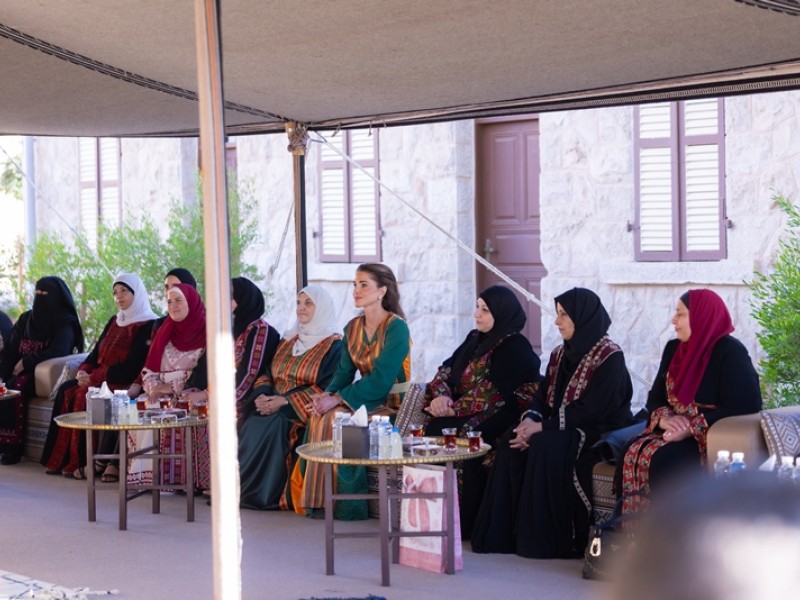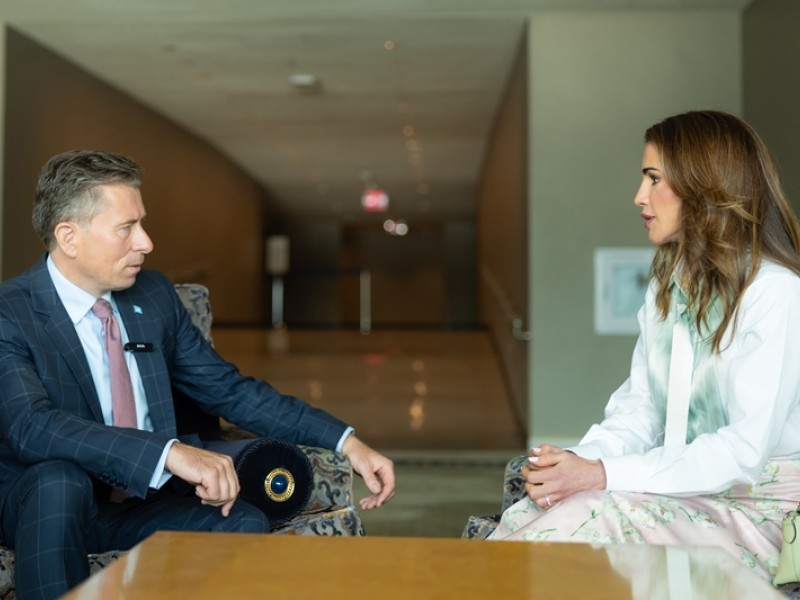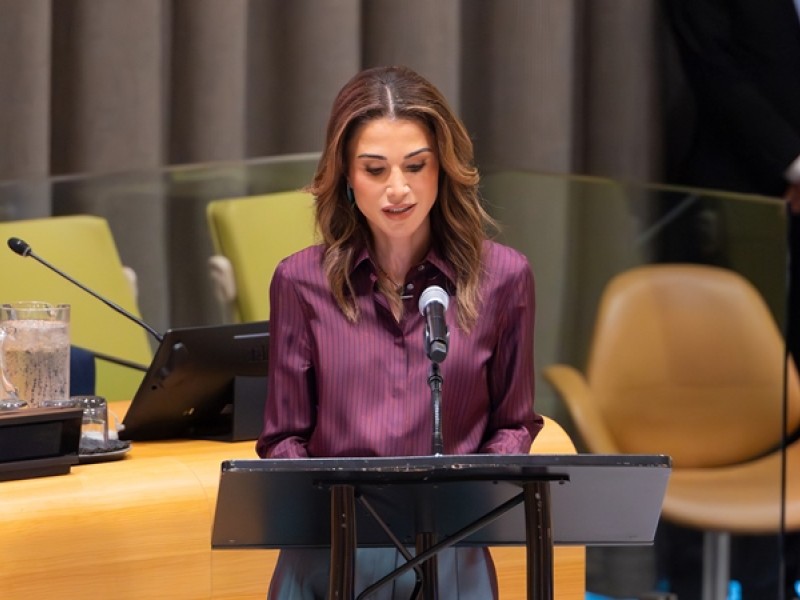Queen Rania Launches Situation Analysis of Children in Jordan

(Office of Her Majesty – Press Department – Amman) - While usually reserved for lighthearted fun and entertainment, the hallways of the Children’s Museum of Jordan saw a different kind of gathering, Monday, as child-health and education experts and policy makers came together to discuss the current trends in Jordan.
Her Majesty Queen Rania Al Abdullah launched the latest Situation Analysis for Children in Jordan, there, bringing some welcomed news about the Kingdom’s progress.
The report, which was prepared by the National Council for Family Affairs (NCFA) and UNICEF with participation from a large number of government and non-government organizations, as well as a number of youth representatives, hails Jordan as a role model for progress in improving the quality of life of its young citizen and identifies current challenges.
Six Jordanian ministers attended the launch and committed specific action plans to tackling these challenges based on the results of the report.
Lending her support to the launch, Queen Rania thanked all the partners for their efforts in highlighting Jordan’s progress and outlining the challenges, and commended the inclusion of the voices of youth in compiling the report, stressing that they should always have a hand in the decisions that directly affect their lives. A number of youth worked on the analysis in partnership with UNICEF and the NCFA to collect the data.
“We should always involve them and listen to them,” said the Queen, who is President of NCFA and UNICEF’s Eminent Advocate for Children. “They are, after all, the majority of the population and have great contributions to make.”
According to the report, Jordan is on track to achieve most of the Millennium Development Goals. Jordan’s human index has improved to ninth out of 19 countries in the region. Still, more needs to be done to improve antenatal care, better monitoring of high-risk pregnancies, and higher post-natal coverage.
The report states that the infant mortality rate has declined to 22 deaths per 1,000 live births and the child mortality rate to 27 per 1,000. Jordan ranks 45th amongst 122 countries in the Education for All Development Index.
The survey confirms that child labor is a problem in the Kingdom. Minister of Planning Suhair Al Ali stated that the ministry is currently finalizing its own report on child labor figures and will release it shortly, with initial figures showing 33,000 child laborers in Jordan, one third of whom are in Amman.
Minister of Education Tayseer Nueimi pledged to increase centers that work to re-integrated drop-outs into the school system. There are currently 19 such centers, which he said will increase to at least 32.
Minister of Social Development Hala Lattouf also promised to increase rehabilitation programs, specifically those related to handicap rehabilitation. Minister of Health Salah Mawajdeh noted that he will work on improving the conditions at the workplace to reduce the risks associated with child labor as the country works to battle the problem.
Minister of Labor Bassem Salem said that the ministry will assess the work being done in East Amman to combat child labor and roll out the project if they find it successful. Minister of Awkaf Abdul Fattah Salah committed to raising the issue during Friday prayers and to educate people through sermons.
The report explores the overall conditions, including the environment, demographics, governance, culture and social factors, which affect the lives of children, which includes at-risk children, at the national and governorate levels and inside the family as well. In addition, the report discusses national efforts to ensure the rights of women and children through legislative and political initiatives, and comprehensive integrated service coverage.
It also focuses on the issue of health and nutrition, as it affects the quality of mothers and children’s survival trends, and the problems that need more attention in this respect while tracing trends in educational service provision and participation therein, starting from early childhood, to basic and secondary education.
It is noteworthy that the report relied on a number of elements espoused in the National Plan of Action for Children. This report is published every five years by UNICEF. This is the first year that UNICEF partners with a local organization to help in the findings of the report. UNICEF is hoping to replicate this example globally. NCFA was chosen as a partner due to their expertise in the field of child and family issues.
UNICEF was established in 1946 and began its co-operation programs in Jordan in 1952. UNICEF works with the Jordanian government, the Royal family and non-government and civil society organizations to ensure the rights of children and women.
UNICEF works in the context of the Convention on the Rights of the Child (CRC), which Jordan endorsed in 1991. The CRC aims at protecting children and providing them with the opportunity to develop in a safe and healthy environment.
In recognition of the family as the natural and fundamental group unit of society and the best environment to prepare generations for productive lives and responsible citizenship, the National Council for Family Affairs (NCFA) was founded by a Royal Decree in 2001.
A civil society organization presided by Her Majesty Queen Rania Al Abdullah, NCFA is an umbrella organization that supports, coordinates and facilitates the work of its partners and relevant institutions which are involved and influential in the field of family affairs.
NCFA contributes to ensuring a better quality of life for Jordanian families through a national vision that supports the country’s development policies and enables the family to attain its optimal aspirations. NCFA works towards maintaining the family’s entity, stability and self-sufficiency through providing the supportive economic, social, and legislative environment.
Featured
Queen Rania's official website
This website does not support old browsers. To view this website, Please upgrade your browser to IE 9 or greater
Your browser is out of date. It has known security flaws and may not display all features of this and other websites. Learn how to update your browser



